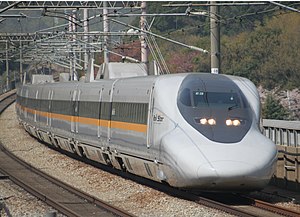
Back 700 سيريس شينكانسن Arabic Shinkansen-Baureihe 700 German Shinkansen Serie 700 Spanish Shinkansen série 700 French Sinkanszen 700-as sorozat Hungarian Shinkansen seri 700 ID Shinkansen Serie 700 Italian 新幹線700系電車 Japanese 신칸센 700계 전동차 Korean Séries 700 - Shinkansen Portuguese
| 700 series | |
|---|---|
 700 series Hikari Rail Star, April 2009 | |
| In service | 13 March 1999 – present |
| Manufacturer | Hitachi, Kawasaki Heavy Industries, Kinki Sharyo, Nippon Sharyo |
| Replaced | 0 series, 100 series, 300 series |
| Constructed | 1997–2006 |
| Scrapped | 2011– |
| Number built | 1,328 vehicles (91 sets) |
| Number in service | 128 vehicles (16 sets)[1] |
| Number preserved | 1 vehicle |
| Number scrapped | 1,180 vehicles (74 sets) |
| Successor | N700 Series Shinkansen, N700S Series Shinkansen |
| Formation | 8/16 cars per trainset |
| Fleet numbers | C1 – C60; B1 – B15; E1 – E16 |
| Capacity | 16-car sets: 1,323 (200 Green + 1,123 Standard) 8-car sets: 571 |
| Operators |
|
| Depots | Osaka, Hakata, Tokyo (1999 – 2020) |
| Lines served | San'yō Shinkansen Hakata-Minami Line Tokaido Shinkansen (1999 – 2020) |
| Specifications | |
| Car body construction | Aluminium |
| Car length | 25 m (82 ft 0 in) (intermediate cars) 27.35 m (89 ft 9 in) (end cars) |
| Width | 3,380 mm (11 ft 1 in) |
| Height | 3.69 m (12 ft 1 in) (without rooftop equipment) |
| Doors | 2 per side |
| Maximum speed |
|
| Traction motors | 48 x 275 kW (369 hp) (16-car set) 24 x 275 kW (369 hp) (8-car set) |
| Power output | 13.2 MW (17,701 hp) (16-car set) 6.6 MW (8,851 hp) (8-car set) |
| Acceleration | 2 km/(h⋅s) (1.2 mph/s) |
| Deceleration | 2.7 km/(h⋅s) (1.7 mph/s) |
| Electric system(s) | 25 kV 60 Hz AC overhead catenary |
| Current collector(s) | Pantograph |
| Safety system(s) | ATC-NS |
| Track gauge | 1,435 mm (4 ft 8+1⁄2 in) standard gauge |
The 700 series (700系, Nana-hyaku-kei) is a Japanese Shinkansen high-speed train type built between 1997 and 2006, and entering service in 1999. Originally designated as "N300" during the development phase, they formed the next generation of Shinkansen vehicles jointly designed by JR Central and JR-West for use on the Tokaido Shinkansen, Hakata Minami Line and the San'yō Shinkansen. Though it has since been withdrawn from service on the Tokaido Shinkansen, it continues to operate on the San'yō Shinkansen and Hakata Minami Line.
- ^ JR電車編成表 2020夏 [JR EMU Formations - Summer 2020] (in Japanese). Japan: Kotsu Shimbunsha. May 2020. pp. 131, 132. ISBN 978-4-330-05020-1.